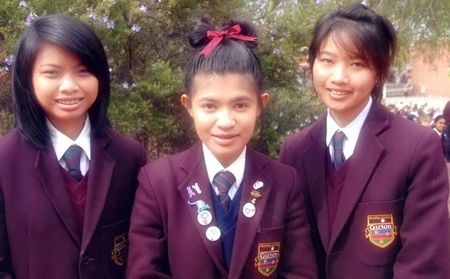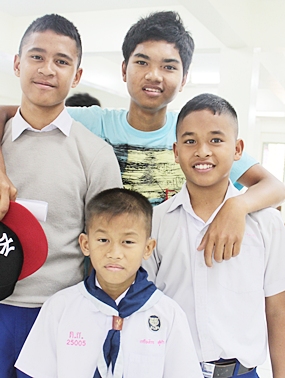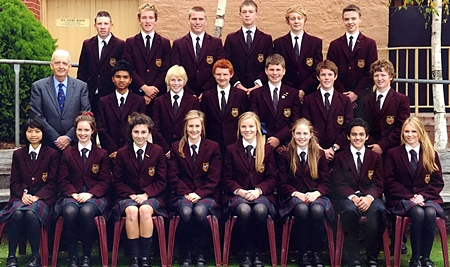Australian Embassy and Thai Airways assist to make dreams real
In an ideal world every student in Thailand would receive English classes taught by qualified and experienced native English speakers, classes would start at an early age, and by grade nine each and every student in Thailand would be fluent.
However, the reality at present is that the majority of students in government schools, and many in private schools, are taught English by teachers who themselves may not have much exposure to the language.
 Pattaya residents Krisana Dahtong, Arunee Boonchuay and Thipparat Chop-prao at Griton Grammar School. All three have received scholarships to continue studying in Australia.
Pattaya residents Krisana Dahtong, Arunee Boonchuay and Thipparat Chop-prao at Griton Grammar School. All three have received scholarships to continue studying in Australia.
Many students leave school with the ability to read and write English, but they may not be able to understand what they have written or what they are reading. Their conversation skills are poor and once away from the classroom many will not have the time or resources to continue learning the language.
 Mick, center, back at home in Pattaya.
Mick, center, back at home in Pattaya.
Immersion in a language is the best way to learn. Everyday practice will build confidence, which in turn will lead to the student becoming more proficient, but this is not possible for everyone.
Since 2004 teenagers from two Thai organisations, the Pattaya Orphanage and the Father Ray Children’s Home, have each spent time in the Australian city of Bendigo, living with local Australian families and attending the local Girton Grammar School.
The Rotary Orphan Student Exchange (R.O.S.E.) program was initially organised by the Rotary Club of Eaglehawk in Bendigo, Australia together with the Rotary Club of Jomtien-Pattaya, the involvement of the Australian Embassy and Thai Airways International have ensured that bureaucracy and costs are kept to a minimum.
Traveling to Australia, experiencing a different culture, moving into a house full of strangers and enrolling at a new school is a big upheaval for any teenager. But the support the Thai students receive from the school and their host families ensures that few problems arise.
Sixteen year old Mick Tohcham has recently returned from Australia and has fond memories of his time down under.
After saying farewell to his friends in Pattaya, Mick boarded his Thai Airways flight for the nine hour journey to Melbourne where he was met by his new family.
He lived with a local Australian couple, whose own four children were all away at university. He settled into school and learned to love the food, including fish and chips.
On his first day at Girton Grammar School Mick was asked to stand in front of two hundred and fifty fellow students and tell his story. “I was very nervous as I could not speak English very well,” Mick remembers, “but a month later my English had improved so much that when they asked me again to tell my story I was not nervous at all.”
Trips to the local Thai restaurant were a treat, but as Mick said, “Thai food in Australia is not the same as back home.”
 Mick, second left middle row, with his classmates at Girton Grammar School.
Mick, second left middle row, with his classmates at Girton Grammar School.
His passion for football saw him being selected for the school’s team, and it was at one match that a scout noticed Mick’s skills with a ball and he was quickly signed to a local team.
Now back in Pattaya, Mick is waiting for the new school year to start in May. In the meantime he will be putting his new found skills to use. Working in a foreign owned restaurant, dealing everyday with foreign customers whose common language is English can only give him more confidence.
While most teenagers have returned to Thailand after one year, three students have received scholarships which mean that they will continue their studies at college and university in Australia.
Arunee Boonchuay was seventeen when she said farewell to her friends, and four years later she is still in Bendigo. She received a scholarship to continue studying in Australia and later this year she is planning to enroll at the prestigious La Trobe University where she will study architecture.
Travelling over to foreign countries is not a possibility for most Thai students. The lucky ones get to make the most of their opportunity to learn a language, experience a new culture and gain new skills.
For those Thai students who want to improve their language skills but do not have the chance to travel overseas, Mick has some advice for learning a language: “Many students say they want to learn English but are too lazy. But if you really want to learn to speak better English you need to practice every day so that you feel more confident.”
More information can be found at www.fr-ray.org




